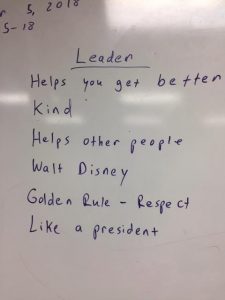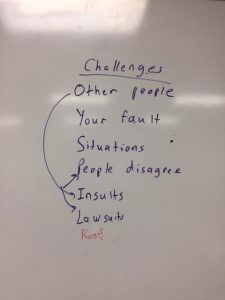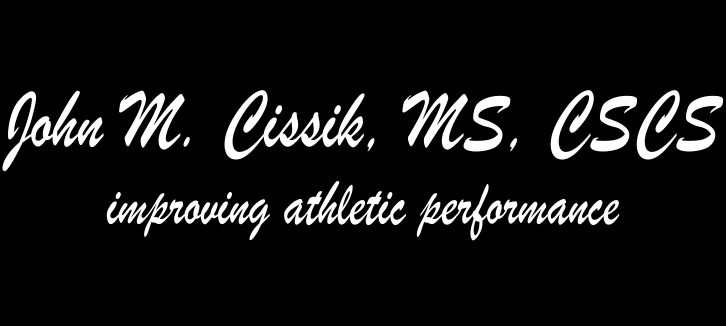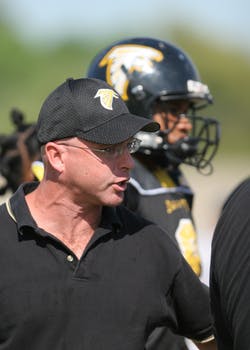Recently I asked some of my social skills students, “What is a leader?” I don’t call this a social skills group with them, I call them my problem solvers. These young men are 5th graders and they are my heavy hitters. We spend a lot of time focusing on self confidence, organization, and leadership.
I’d like to start this post by sharing their thoughts on the subject, then I’ll share mine. First, below is a photo that summarized their thoughts on “What is a leader:”

Their first thought was that a leader helps you get better. I find it interesting that this was the first thought and I think this is spot on. As a teacher and a coach, it is your job to make everyone better and to help them reach their potential no matter what that may be. We may all have different potentials, but we all need someone to help us get there.
Their second thought was that leaders are kind. This ties in with point five which is the Golden Rule (i.e. respect others like you’d like to be respected). This is something that some coaches have difficulty with. There’s a way to set expectations, keep athletes accountable, enforce discipline, and correct mistakes while allowing an athlete to maintain their dignity and self respect. Anyone can yell, can you motivate and teach?
The third thought was that leaders help other people. I feel very strongly about the concept of service. If you are in a leadership position then it’s about serving other people. Teachers and coaches strive to make others better, it’s not about themselves.
The Walt Disney example was interesting. When I asked for more detail, the student that mentioned it described someone who had a vision, had a plan, and executed it. This goes along with the last point, “Like a president.” The idea being that if you are in charge you should make decisions for the greater good even if they are not popular.
Some people are drawn to leadership roles and they seek them out. Others fall into those roles and have to grow into them. Others don’t want anything to do with leadership, this sums up my fifth graders pretty well. Our next discussion dealt with what kind of challenges leaders face. The picture below shows their thoughts:
 A lot of the challenges that they identified have to do with the fact that leaders have to work with people, which is challenging. As I’ve said many times, athletes aren’t spreadsheets, coaching would be easier if they were! The teacher side of me will also tell you that students aren’t lesson plans or curricula. Their concerns with this were that people disagree with leaders, everyone has their own opinion. Some people don’t disagree well (thus the insults and lawsuits comments). This is always hard to handle. It’s hard not to take attacks against your decisions personally. This is especially true in coaching where everyone is an expert and social media gives them a medium to voice it instantly and anonymously.
A lot of the challenges that they identified have to do with the fact that leaders have to work with people, which is challenging. As I’ve said many times, athletes aren’t spreadsheets, coaching would be easier if they were! The teacher side of me will also tell you that students aren’t lesson plans or curricula. Their concerns with this were that people disagree with leaders, everyone has their own opinion. Some people don’t disagree well (thus the insults and lawsuits comments). This is always hard to handle. It’s hard not to take attacks against your decisions personally. This is especially true in coaching where everyone is an expert and social media gives them a medium to voice it instantly and anonymously.
Leaders have to deal with stressful, difficult situations where there aren’t always clear cut good choices, precedent, or there aren’t always people that you can ask for advice. The longer I coach and teach, the fewer of these that I see – but I still see some every once in a while. It’s important to have someone you can go to in order to bounce ideas and decisions off of. They don’t have to be a coach or teacher, just someone you trust to shoot straight.
Finally, we talked about fault. This is something people don’t get and don’t accept about leadership. When you are a leader it’s easy to accept winning seasons, elite athletes that you “coached,” and smart students that you “taught.” But if you accept credit for that, you also accept the responsibility for the losses, below average athletes, and students that struggled. In other words, when you are a leader it is your fault. If my baseball team wins by 14 then I look like a pretty smart coach. But if we then turn around and lose by 12 to a poor team on the next game (and this happened to me this season) then it’s also my fault for not getting my team prepared to play.
So, it’s been a rambling post to this point. What are the take home messages about leadership?
- Leaders work with people. If you don’t like people this is the wrong thing for you to be doing.
- Leaders serve other people. Service to something larger than yourself is important and sets an incredible example for young men and women.
- As a leader your job is to make other people better.
- Leaders have to make lonely, difficult decisions. You have to be okay with this, but it’s a great idea to have someone you trust to shoot you straight.
- When you are a leader, it’s your fault. You can’t take credit without taking blame.

